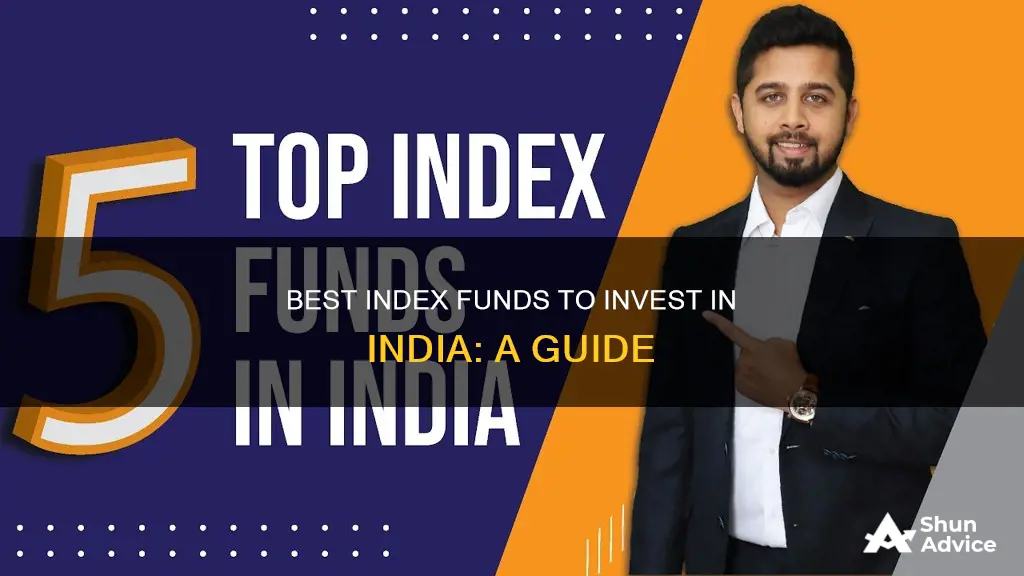
Index funds are a type of mutual fund or exchange-traded fund (ETF) that aims to replicate the performance of a market index, such as the Nifty 50 or the Sensex. These funds are passively managed and have gained popularity due to their low expense ratios and diversified portfolios. When choosing an index fund to invest in, it is important to consider factors such as investment objectives, risk tolerance, expense ratios, and fund managers. Here is a list of some of the best index funds to invest in India, offering investors a simple and cost-effective way to gain exposure to the market:
- UTI Nifty Index Fund
- ICICI Prudential Nifty Next 50 Index Fund
- Mirae Asset Nifty 50 ETF
- HDFC Market Fund - Sensex Plan
- Nippon India Index Fund - Sensex Plan
- SBI Nifty Index Fund
- Motilal Oswal Nasdaq 100 ETF
- Kotak Nifty ETF
- IDFC Nifty 100 Index Fund
- Axis Nifty ETF
What You'll Learn

Top index funds in India by AUM
Index funds are a type of mutual fund or exchange-traded fund (ETF) that replicates the performance of a certain market index, such as the Nifty 50 or the S&P 500. They offer a diversified portfolio of stocks or bonds at a low cost because they passively track an index's composition. Here is a list of the top index funds in India by Assets Under Management (AUM):
UTI Nifty 50 Index Fund:
With a 3-year return of 20.46%, this fund has consistently performed well, doubling investments every four years. It is ideal for those with a minimum 5-year investment horizon and a high-risk appetite.
HDFC Index Fund- Nifty 50 Plan:
This fund has generated returns of 28.56% in the past year and has demonstrated the ability to double invested capital every four years. It is suitable for high-risk, equity investors.
ICICI Prudential Nifty 50 Index Fund:
This fund has returned 28.55% in the past year and can double invested capital every four years. It is suitable for investors seeking long-term wealth creation.
SBI Nifty Index Fund:
SBI's Nifty Index Fund has delivered returns of 28.41% over the past year and has the capability to double invested capital every four years. It is suitable for high-risk-taking equity investors.
UTI Nifty200 Momentum 30 Index Fund:
This fund has delivered impressive returns of 67.34% in the past year and is suitable for investors seeking higher returns through a momentum-based approach with increased risk.
HDFC Index Fund - S&P BSE Sensex Plan:
This fund invests in companies included in the S&P BSE Sensex and has yielded returns of 25.17% in the past year. It can double invested capital every four years.
ICICI Prudential Nifty Next 50 Index Fund:
With a 3-year return of 23.53%, this fund is suitable for investors looking for exposure to index schemes replicating the Nifty Next 50 Index.
UTI Nifty Next 50 Index Fund:
This fund aims to invest in the Nifty Next 50 Index and attain returns equivalent to the performance of the index through a passive investment approach.
Motilal Oswal S&P 500 Index Fund:
This fund falls under the International Index category and invests in 500 stocks comprising the S&P 500 Index.
Navi Nifty 50 Index Fund - Direct Plan - Growth:
This is a passively managed fund that aims to replicate the index's returns. It is suitable for those looking for capital appreciation over the long term.
Index funds are a cost-effective and diverse approach for investors to participate in the financial markets. They are suitable for those seeking broad market exposure while minimising expenses and are advised for long-term investments of 5 years or more.
Hedge Fund Investment: Choosing the Right One
You may want to see also

Advantages of investing in index funds
Index funds are considered one of the smartest types of investments. Here are some advantages of investing in index funds:
Broad Diversification
Index funds instantly diversify your portfolio, minimising the likelihood of losing some or all of your money. For example, an index fund that tracks the S&P 500 would hold about 500 different stocks. While the performance of each of these stocks fluctuates over time, investing in a fund that holds all of them matches the performance of your portfolio to that of the index itself. Diversifying your portfolio among so many companies ensures that the value of your portfolio is not overly correlated with the fortunes of any one company listed in the index.
Low Costs
Index funds are passively managed, meaning they have low management fees. The expense ratios of index funds are typically between 0.05% and 0.07%, and some have expense ratios as low as 0%. In contrast, the expense ratios of actively managed mutual funds often range between 1% and 2%. The low costs of index funds mean that more money is working for you, increasing your potential returns.
Lower Taxes on Capital Gains
Index funds have low turnover ratios, meaning they make fewer trades in a given year. This results in fewer capital gains distributions passed along to shareholders, reducing the taxes they owe.
Attractive Returns
Index funds have historically outperformed other types of funds that are actively managed by top investment firms. Even the smartest and most diligent portfolio managers can rarely steer actively managed funds to beat index funds.
Accessibility for Small Investors
Index funds often have lower minimum investment requirements, making them more accessible to a wider range of investors. This allows those with less wealth to engage in the market and construct a diverse portfolio without making a large initial investment.
Utility Index Funds: When to Invest for Maximum Returns
You may want to see also

Who should invest in index funds?
Index funds are a great investment option for those who want to keep things simple and don't want to spend time tracking the performance of their funds. They are also good for those who don't want to take on the extra risk of actively managed funds, which can sometimes underperform the market. Here are the types of investors who should consider investing in index funds:
- Risk-averse investors: Index funds are ideal for those who are afraid of market risks. The diversified nature of index funds helps to mitigate these risks.
- Cost-conscious investors: Index funds are passively managed, meaning they don't require a team of analysts or fund managers to research and make investment decisions. As a result, the fees associated with index funds are typically lower than those of actively managed funds.
- Investors seeking a diverse portfolio: Index funds provide exposure to a wide range of stocks across different sectors, giving investors a very broad exposure to the stock market.
- Long-term investors: Index funds are designed to replicate the performance of a specific market index, and this strategy often results in consistent and predictable returns over the long term. This makes index funds suitable for investors with long-term investment horizons who are looking for stable growth.
- Hands-off investors: Index funds require little supervision and don't need to be frequently monitored or adjusted, making them a good option for those who don't have the time or inclination to actively manage their investments.
Funding Sources for Private Investment: Where Does Money Come From?
You may want to see also

Why should you invest in index funds?
Index funds are a great investment option for those looking to mirror the performance of a specific market index, such as the Nifty 50 or the S&P 500. Here are some reasons why you should consider investing in index funds:
Low Costs and Diversification:
Index funds offer a cost-effective way to gain exposure to a diverse range of stocks or bonds by passively tracking a market index. They have lower expense ratios than actively managed funds, making them an attractive option for long-term investors seeking broad market participation while minimising costs. Index funds provide quick diversification across sectors and stocks, reducing individual stock risk and resulting in a more stable and well-balanced investment portfolio.
Reduced Risk:
Index funds offer lower risk compared to owning a few individual stocks due to their diversified nature. While you can still lose money in an index fund, historical data suggests that the risk of losing money is significantly reduced over longer investment horizons.
Long-Term Investment:
Index funds are designed to replicate the performance of a specific market index, and this strategy often results in consistent and predictable returns. This makes index funds ideal for long-term investors seeking stable growth. Additionally, index funds are less prone to the impact of market downturns due to their diversified nature.
Accessibility:
Index funds often have lower minimum investment requirements, making them accessible to a wider range of investors. They are also straightforward investment options as they do not require extensive knowledge of stock markets.
Performance and Transparency:
Index funds have delivered solid long-term returns, with the S&P 500, for example, averaging about a 10% annual return over time. The holdings of index funds are also publicly disclosed and regularly updated, providing transparency to investors about the assets held within the fund.
Simplicity and Reduced Bias:
Index funds are passively managed, meaning the fund manager only replicates the chosen index, reducing the potential for fund manager bias. This makes index funds a simple and unbiased investment option, suitable for investors who want to keep their investment strategy straightforward.
Overall, index funds offer a low-cost, diversified, and relatively safe investment option for those seeking to mirror the performance of a specific market index. They are particularly well-suited for long-term investors and those looking for a simple and accessible way to invest in the stock market.
Best S&P Index Funds: Top Picks for Your Portfolio
You may want to see also

How to invest in the best index funds?
Index funds are a type of mutual fund or exchange-traded fund (ETF) that aims to replicate the performance of a market index, such as the Nifty 50 or the Sensex. They are passively managed, meaning they do not require a team of analysts to research the best investments, and they have a lower expense ratio compared to actively managed funds. Index funds are ideal for investors who want to keep their equity investment simple and are risk-averse. Here are the steps to invest in the best index funds:
- Sign up on a platform: You can sign up on platforms such as ET Money, INDmoney, or ClearTax to get started. These platforms offer an easy and hassle-free procedure to invest in index funds.
- Choose the fund: Select the index fund you wish to invest in. Consider factors such as past returns, volatility, downside capture ratio, assets under management (AUM), expense ratios, and the underlying stocks and sectors. You can also look at the top index funds in India, such as UTI Nifty 50 Index Fund, HDFC Index Fund- Nifty 50 Plan, and ICICI Prudential Nifty 50 Index Fund.
- Choose the investment mode: Decide whether you want to invest a lump sum in index funds or start a Systematic Investment Plan (SIP).
- Make the payment: You can make the payment instantly through Net Banking or UPI to invest in the chosen fund.
Some additional considerations when investing in index funds include:
- Risk tolerance: Index funds are less prone to equity-related volatility and risks since they map an index. However, during a market slump, actively managed funds may be a better option.
- Return factor: Index funds do not aim to beat the benchmark but to replicate its performance. The returns may deviate slightly from the index due to tracking errors, so it is essential to shortlist funds with minimum tracking errors.
- Cost of investment: Index funds usually have lower expense ratios than actively managed funds. Compare the expense ratios of different index funds to make an informed decision.
- Investment horizon: Index funds are generally suitable for individuals with a long-term investment horizon, typically more than seven years, to average out short-term fluctuations and generate returns.
- Financial goals: Consider your financial goals and ensure that investing in index funds aligns with them. Equity funds are ideal for long-term goals like wealth creation or retirement planning.
Mutual Funds: Where to Invest for Maximum Returns
You may want to see also
Frequently asked questions
There is no single "best" index fund, as it depends on your investment goals and preferences. However, some popular options include the UTI Nifty 50 Index Fund, HDFC Index Fund- Nifty 50 Plan, and ICICI Prudential Nifty 50 Index Fund.
When choosing an index fund, consider factors such as your investment objectives, risk tolerance, expense ratios, tracking error, fund manager and fund house, and taxation.
Index funds offer a cost-effective and diverse approach to investing in the financial markets by mirroring a specific market index. They have lower expense ratios than actively managed funds, making them attractive for long-term investors seeking broad market exposure while minimising costs.
Index funds are ideal for investors who are risk-averse and seek predictable returns. They are also suitable for those who want a diverse portfolio without the need for active management.
Index funds track stock market indices, so they can suffer losses during a market downturn. Additionally, there may be a divergence between the returns of the index and the index fund due to tracking errors.







